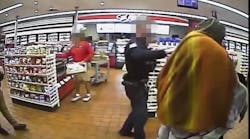Two Placer County teenage girls were arrested for allegedly using drugged milkshakes to knock out the parents of one of the girls so they could log on to the Internet, Rocklin police said.
Internet access at the Rocklin home was routinely shut off at 10 p.m., said Lt. Lon Milka, a department spokesman.
Milka said that on Friday evening, a 15-year-old girl -- who had a 16-year-old friend from Roseville visiting -- offered to pick up milkshakes from a local fast-food restaurant for her parents.
The parents drank about a quarter of the milkshakes but didn't finish them, saying they tasted funny and were grainy, Milka said.
But the shakes -- loaded with prescription sleep aids allegedly provided by the friend -- were effective, and the parents quickly fell asleep.
They awoke at 1 a.m. with unexplained hangover symptoms, but went back to sleep. In the morning, with the headache and grogginess still present, they went to the Rocklin police station to pick up a drug test kit, Milka said.
"Many parents buy them and have their kids' urine tested," Milka said. But in this case, they used the $5 kit to test themselves, he said.
When the parents tested positive, they alerted the police, and the girls were taken to juvenile hall.
"The girls wanted to use the Internet, and they'd go to whatever means they had to," Milka said.
What the girls did on the Internet that night is not yet clear, Milka said.
"For our investigation, that wasn't as important as the drugging with the milkshake," Milka said.
It's also unclear whether someone manually shut off wireless Internet access each night at 10 p.m. or it happened automatically.
A little bit of adolescent pushback, as teens begin to express their individuality, is good, said Leslie Whitten Baughman, a child therapist with a practice in Sacramento. But drugging your parents "would not be a healthy level of rebellion."
The 15-year-old told police that her parents' Internet policy was "too strict," Milka said.
Teens often fear being left out of "once-in-a-lifetime" events, which they might experience on the Internet, said Gordon Richards, executive director of EMQ FamiliesFirst, a children's social services nonprofit.
While the alleged actions seem extreme, Richards said it's important to note that the human brain is still developing in teen years -- helping to explain the apparent lack of judgment.
Milka said he's never seen anything like the Rocklin case.
The teens were arrested on charges of conspiracy and willfully mingling a pharmaceutical with food.
"If they were adults, they could be facing prison time," Milka said.
He said the girls were arrested as juveniles and that it would be up to the District Attorney's Office to decide if the crime justifies adult punishment. Because the girls are juveniles, their names are not being released to the media.
Milka said he didn't know how long they were in custody or whether they had been released.
Copyright 2013 - The Sacramento Bee
McClatchy-Tribune News Service


